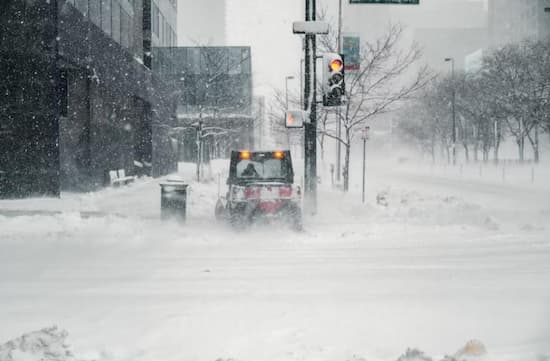
Surviving Extreme Cold Weather: Understanding and Preparation
Extreme cold weather can pose serious risks and challenges for individuals and communities. Sudden temperature drops or even snowstorms often caught people off guard, and can cause disruption to daily life, bodily injuries, or in the worst case, claim lives. This is why understanding the causes, effects, and ways to cope with extreme cold weather is crucial for staying safe and minimizing the impact of such conditions.
In this blog post, we will explore the causes and effects of extreme cold weather, and practical strategies for dealing with these conditions. With devoted attention and thorough preparation, you’ll have a greater chance to make it through the coldness intact. Read on to explore!

What is Extreme Cold weather?
Extreme cold weather refers to temperatures significantly below normal or those that pose a substantial risk to human health and safety. It is often characterized by sub-zero temperatures and can be accompanied by severe wind chill, making it feel even colder. Let's delve into the causes and results of extreme cold weather.
Cause
Extreme cold weather can occur due to a variety of factors. Here are two of them:
- Climate change. There is widespread scientific consensus that climate change is real and is having a greater impact on global climate patterns, which includes increased occurrence of extreme weather like cold fronts and winter storms.
- Existing climate patterns. Climate patterns like La Niña or Arctic outbreak can cause coldness or even winter storms. This is best illustrated by the Texas winter storm in 2021, which, according to some meteorological experts, was caused by Arctic outbreak. The Arctic break refers to the cold air originating from Asia, which then travels through the North Pole into North America. These potent air masses can cause sharp temperature drops in regions affected.
Result
The effects of extreme cold weather can be significant and potentially dangerous. Some notable effects include:
- Frostbite: Prolonged exposure to extreme cold can lead to frostbite, which occurs when skin and underlying tissues freeze. It commonly affects exposed extremities such as fingers, toes, ears, and noses.
- Hypothermia: Extremely cold temperatures can cause the body's core temperature to drop dangerously low, resulting in hypothermia. Symptoms include shivering, confusion, loss of coordination, and, in severe cases, organ failure or even death.
What Is Considered Dangerous Temperature of Cold Weather?
The threshold for dangerous cold temperatures can vary depending on factors such as wind chill and an individual's health condition. However, generally, temperatures below 13 degrees Fahrenheit (-10 degrees Celsius) are to be treated with caution. In such temperatures, outdoor activities should be avoided if possible to ensure safety. And if it is not possible to avoid, it is advisable to limit the time spent outdoors.
How to Deal With Extreme Cold Weather?
When facing extreme cold weather conditions, taking appropriate measures is crucial for personal safety and well-being. Here are some strategies to help you cope:
Dress Warm
The most direct way to deal with extreme weather is to dress warm. Layer your clothing, wear a hat, gloves, and warm socks, and use insulated and waterproof boots to protect against the cold. Thermal underwear and high-quality outerwear are also essential.
Stay Hydrated
This is an often overlooked point, since many people only consider hydration in the context of hot weather. But old weather can dehydrate the body too, so it's important to drink plenty of fluids when temperature drops. Opt for warm beverages and avoid excessive consumption of caffeine or alcohol also help improve hydration.
Stock High Calorie Food On-Hand
During extreme cold weather, access to food may be limited. Ensure you have a supply of non-perishable, high-calorie foods that require little to no cooking, which can keep you free of hunger and powered up in the ordeal of coldness.
Prepare Your Home
Insulate your home properly by sealing drafts, insulating windows and doors, and using weatherstripping. Ensure your heating system is well-maintained and consider having a backup heating source, such as a portable heater.
Get Tools Ready for Cold Weather
Ensure you have the necessary tools for dealing with cold weather, such as snow shovels, ice melt, and windshield scrapers. Moreover, consider having a backup power source in case the grid fails. Anker SOLIX F2000 is a good option. With 2048Wh of power capacity, this reliable and durably built powerhouse can power up your basic appliances and keep you out of trouble caused by possible power outages.

Protect Your Extremities Outdoors
If some outdoor activities are unavoidable during extreme cold weather, cover exposed skin to minimize the risk of frostbite. Use hand and foot warmers, and wear appropriate protective gear, such as goggles and face masks, if needed.
Know Where to Find Emergency Shelter if You Are Outdoors
If you find yourself outdoors during extreme cold weather and are unable to get home in time, it's crucial to know the locations of emergency shelters in your area. Research community centers, churches, or other facilities that provide temporary shelter during emergencies. Stay informed about local emergency services and evacuation procedures.
Wrap Up
Surviving extreme cold weather requires preparation, awareness, and proactive measures. Understanding the causes and effects of extreme cold weather can help you better prepare for such conditions. By dressing appropriately, staying hydrated, stocking up on essential supplies, and taking steps to protect yourself and your home, you can minimize the risks associated with extreme cold weather.
Moreover, remember to stay updated on weather forecasts, follow advice and warnings from local authorities, and prioritize your safety and well-being. With the right knowledge and preparation, you can navigate extreme cold weather conditions with confidence and ensure the well-being of yourself and your loved ones. Stay warm, stay safe!





